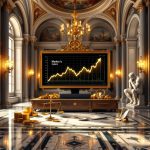Crowds, Masses, and Markets: Why Vector Thinking Outruns Old-School Psychology
Updated Aug 20, 2025
The modern investor is drowning in data but starving for clarity. Prices move in microbursts, narratives flip by the hour, and everyone—retail and institutional—gets pulled into the slipstream of collective behavior. For years we tried to decode these swings with classic crowd and mass-psychology models. Useful once, they’ve turned blunt in a marketplace that behaves more like a complex system than a classroom chart. That’s where vector thinking comes in: a multi-dimensional way of reading markets that tracks direction, magnitude, and interaction of forces beneath the tape—sentiment flows, liquidity currents, and institutional posture—rather than assuming straight lines from headline to price.
Crowd Behavior: The False Comfort of Consensus
Markets like to pretend participants are rational actors; crowds prove otherwise, especially under stress or euphoria. Traditional takes frame cause and effect as linear: big news drops, price reacts, analysts connect A to B with tidy arrows. The premise is that if you can map the crowd, you can forecast it—or even manage it.
Reality is messier. A crowd isn’t the sum of individuals, it’s an organism—prone to emotional contagion, feedback loops, and the amplification of fear and greed. What we call mass behavior isn’t just shared information; it’s synchronized emotion. That’s why markets overshoot in both directions. When the herd moves, it doesn’t tiptoe—it accelerates with force and velocity, sometimes with a blind edge that only fades after the damage or the melt-up is done. Vector thinking accepts that nonlinearity and reads the flow, not the myth of consensus.
The Obsolescence of Linear and Binary Thinking
Most market participants still default to linear or binary thinking. The linear mind sees the world as a chain of dominoes: “This event happened, so this result will follow.” The binary mind reduces everything to a coin toss: “Is this bullish or bearish? Up or down?” These frameworks worked well enough in slower, less interconnected markets. But today, they fall flat. The crowd’s behavior isn’t just reactive—it’s recursive, layered, and constantly evolving.
Consider the 2020 COVID crash. The linear view said: “Pandemic equals economic shutdown, therefore, sell everything.” Binary thinkers asked: “Are we in a recession or a recovery?” But the market was operating in three dimensions, not two. The actual forces at play were far more complex.
- Crowd sentiment: Panic at levels rarely seen before.
- Pre-event psychology: A decade-long bull run had numbed participants to risk, fostering complacency.
- Institutional action: Central banks and governments, sensing the emotional tide, unleashed unprecedented liquidity.
- Sellers: Acts of panic, not strategy, dominated the tape—indicating exhaustion was near.
- Media: Headlines became monochrome, amplifying fear and eliminating nuance.
Traditional analysis failed to capture the pressure map forming below the surface: the emotional energy, the institutional response, the exhaustion of sellers, and the historical echoes of previous crises. The market didn’t rebound because conditions improved overnight—it snapped back because the emotional spring had been overstretched, and the vector, the directional force of mass psychology, reversed.
Mass Behavior: The Feedback Machine
Mass behavior is more than just the sum of individual actions. It is a feedback machine, where perception becomes reality. The crowd watches itself in the mirror, and each reaction triggers another. In the age of social media, high-frequency trading, and news cycles measured in milliseconds, these feedback loops intensify.
This is why mass behavior can both create and destroy value at shocking speeds. When news hits, the crowd doesn’t simply react—it anticipates, front-runs, and even tries to outsmart itself. This reflexivity fuels volatility, as each participant tries to get ahead of the next. In this environment, traditional models of mass psychology—anchored in linear logic—become obsolete.
Vector thinking offers a new map. It asks: What are the forces at play? Which direction are they moving? How strong is the emotional current? What is building beneath the surface that others can’t see? It’s not about what’s happening—it’s about why, how, and what’s coming next.
Vector Thinking: The New Mass Psychology
Vector thinking is not just a method—it’s a mindset. It refuses to accept the obvious or the binary. Instead, it interrogates the market’s emotional terrain, seeking out the pressure points where energy accumulates and is released. In this model, every market event is a node in a network of forces, each pulling or pushing in different directions.
- Emotional Baseline: What mood was the crowd in before the event?
- Surprise Factor: How shocked or prepared is the market for this development?
- Algorithmic Influence: Are automated systems amplifying or muting the emotional response?
- Historical Templates: Does this moment rhyme with past episodes of fear or greed?
- Second-Order Reactions: Not just “what happens,” but “what happens after the reaction to what happens?”
In vector analysis, the market is not a static chart—it is a living field of emotional energy. The narrative is often a distraction, bait for the crowd. The real action lies in the invisible vectors—the forces most traders never see coming.
Case Study: The 2020 COVID Crash Revisited
Let’s revisit the 2020 crash through the lens of vector thinking. The world was blindsided by a pandemic, and markets plunged in a matter of days.
- Linear Mindset: “Pandemic hits, stocks go down. Sell now.”
- Binary Mindset: “Either we’re in a recession, or we’re about to recover. Which is it?”
- Vector Mindset: “What emotional fault lines just shifted? Are central banks about to inject adrenaline? How close is the crowd to exhaustion?”
The vector approach saw not just the panic, but the setup for a reversal. Panic-driven sellers, exhausted by their own fear, created the conditions for a snapback. Central banks stood ready with liquidity. The headlines, having reached a psychological extreme, signaled the bottom. The emotional energy was spent—the vector was about to reverse direction.
Crowd Behavior and the Anatomy of Extremes
Crowd behavior is most powerful at the extremes. When optimism or pessimism reaches a fever pitch, the market becomes a pressure cooker. Traditional signals—valuation, earnings, even news—are overwhelmed by the sheer force of collective emotion. This is why tops and bottoms are so often marked by capitulation or mania, not by rational analysis.
Vector thinking excels here. It recognizes that the market’s true inflection points are not found in spreadsheets, but in the collective psyche. When fear is universal, the emotional spring is stretched to its limit. When greed is unchecked, the same is true in the opposite direction. The vectorist does not predict the future—they map the pressure points and watch for the moment when the current breaks.
Beyond Prediction: Inference and Adaptation
Linear and binary thinking are obsessed with prediction. “What happens next?” is their constant refrain. Vector thinking is different. It seeks to make inferences about the state of the market, not predictions about its direction. It focuses on the forces that are building, the emotional energy being stored, and the potential for sudden release.
This approach is inherently adaptive. It accepts uncertainty and ambiguity. It understands that the market is a living system, not a machine. The best vectorists are not fortune-tellers—they are observers, listeners, and interpreters of the emotional field. They know that the real trade is often buried in the noise, hidden at the intersection of conflicting forces.
Noise, Sentiment, and Volatility: The New Frontline
In the past, noise was considered a distraction—something to be filtered out so the “real” signal could emerge. Today, noise is the signal. The constant hum of news, opinion, and algorithmic trading creates a shifting emotional landscape. Sentiment and volatility are no longer background static—they are the main event.
Vector psychology puts the emotional field front and center. It treats volatility as a map, sentiment as a chart, and narrative as bait. The real opportunities are found in the pressure points where emotion, expectation, and surprise collide. These are the places where the crowd’s behavior becomes most predictable—where mass psychology reaches its limits and reverses direction.
Applying Vector Thinking: A Practical Approach
How does one apply vector thinking in real market conditions? It begins with abandoning the need for certainty. Instead, focus on mapping the emotional terrain:
- Gauge the Baseline: What is the prevailing mood? Is the crowd complacent, fearful, or greedy?
- Identify Pressure Points: Where is emotional energy building? What events could trigger a release?
- Watch for Extremes: Monitor sentiment indicators, volatility indexes, and narrative shifts for signs of capitulation or mania.
- Infer, Don’t Predict: Make educated guesses about the direction of emotional currents, not precise forecasts.
- Adapt Quickly: Be willing to shift your perspective as the emotional field evolves. Flexibility is the edge.
Vector Thinking in Action: Recent Examples
In recent years, we’ve seen this play out time and again. The meme stock craze of 2021 was not a fundamental story—it was a pressure wave of collective emotion. The rally in cryptocurrencies, the crash in tech stocks, the swings in energy prices—all were shaped by the invisible hand of mass behavior, amplified by technology and social media.
Each time, linear and
Conclusion Reforged – No Mercy, No Myths
Forget balance. Forget calm. The market is war disguised as commerce—fought not with facts, but with fear, greed, and mass delusion.
Seneca didn’t preach patience so you could wait—he meant endurance in the face of madness. Plato didn’t wax poetic on discipline for aesthetic’s sake—he meant weaponized self-mastery. Their truths aren’t quaint—they’re survival protocols.
The market is not rational. It is a battleground of dopamine and cortisol. Emotions are not noise; they are signals. Crowd psychology isn’t a theory—it’s a battlefield map. Technical analysis? That’s your compass through the emotional minefield.
? Fear doesn’t just shake hands with crashes—it fuels them.
? Greed doesn’t just birth bubbles—it detonates them.
But here’s the riddle: The crowd doesn’t think. It flinches. It stampedes. And you? You either learn to hunt the herd… or get trampled by it.
Charts aren’t just numbers—they’re hieroglyphics of human emotion. Each panic candle, each euphoric breakout—they’re cries from the herd. Your job? Read them. Exploit them.
? Master your own fear and you’ll see opportunity where others see endings.
? Trade against the herd, and you’re no longer prey—you’re the predator.
Because in the end, survival isn’t enough. You came to win.
And winning means having the guts to buy when blood is on the screen and the clarity to sell when champagne floods the headlines.
There is no safety. Only strategy.
Dominate the chaos—or become a story told by the victors.
The Blueprint for Bold Thinking













